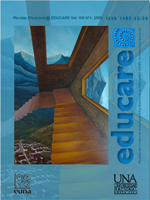Hacia una visión holística de la educación universitaria: el amor y el caos un proceso creativo para el aprendizaje
DOI:
https://doi.org/10.15359/ree.13-1.10Keywords:
superior education, holistic, love, not knowing, caos, creativityAbstract
In this essay it is stated that for superior education to transcend, it must develop from within the idea that love is the fundamental reference of life, and it must potentiate this essence, beyond what is external and apparent and beyond the isolated subjects of the curricula, which many times are no more than words and proposals on paper, which far from germinating humanity, lead to its extinction. It involves a vision of Universal Love that considers art as a way of expression and encounter.
References
Assman, H. (2002). Placer y ternura en Educación. Hacia una sociedad aprendiente. Madrid,
España: Narcea Ediciones.
Bach, R. (2004). Mensajes para siempre. Buenos Aires, Argentina: Vergara & Riba Editoras.
Boff, L. (1996). Ecología: grito de la tierra, grito de los pobres. Madrid, España: Editorial Trotta.
Boff, L. (2002). Espiritualidad: un camino de transformación. Santander, España: Salterrae.
Bohm, D. (1995). Teoría del orden implicado. Barcelona, España: Editorial Kairós.
Bohm, D. (2001). Sobre el diálogo. Barcelona, España: Editorial Kairós.
Bohm, D. (2002). La totalidad y el orden implicado. Barcelona, España: Editorial Kairós.
Briggs, J. & Peat, D. (1999). Las siete Leyes del Caos. Las ventajas de una vida caótica. Barcelona,
España: Revelaciones.
Capra, F. (1982): El Punto Crucial. Buenos Aires, Argentina: Troquel.
Cosachov, M. (2000). Entre el cielo y la tierra. Un viaje por el mapa del conocimiento. Buenos
Aires, Argentina: Biblos.
Eisler, R. (1998). Placer sagrado: Sexo, Mitos, y Política del cuerpo. Santiago, Chile: Editorial
Cuatro vientos.
Gallegos, R. (1997). Una sola conciencia. Enfoque holístico sobre el futuro de la humanidad.
México: Editorial Pax.
Gallegos, R. (1999). Educación holística. Pedagogía del amor universal. México: Editorial Pax.
Gutiérrez, F. & Prieto, D. (2004). Mediación pedagógica. Guatemala: Universidad San Carlos de
Guatemala.
Leonard, G. (1987). El pulso silencioso. Búsqueda del ritmo perfecto que existe dentro de nosotros.
Madrid, España: Edaf.
Maturana, H. (1989). Emociones y lenguaje en educación y política. Santiago, Chile: Dolmen
Ediciones.
Maturana, H. (1999). Transformación en la convivencia. Santiago, Chile: Dolmen Ediciones.
Morin, E. (2003). Método V. La humanidad de la humanidad. La identidad humana. Madrid,
España: Cátedra Teorema.
Prado, C. & Gutiérrez, F. (2004). Germinando Humanidad. Pedagogía del aprendizaje. Guatemala:
Save the Children-Noruega.
Rodríguez, R. (1997). Del Universo al Ser Humano: Hacia una concepción planetaria para el siglo
XXI. Madrid, España: McGraw-Hill.
Shree, B. (Osho). (1999). Meditación: una introducción a la comprensión contemporánea de la
meditación. Barcelona, España: Editorial Debate.
Downloads
Published
How to Cite
Issue
Section
License
1. In case the submitted paper is accepted for publication, the author(s) FREELY, COSTLESS, EXCLUSIVELY AND FOR AN INDEFINITE TERM transfer copyrights and patrimonial rights to Universidad Nacional (UNA, Costa Rica). For more details check the Originality Statement and Copyright Transfer Agreement
2. REUTILIZATION RIGHTS: UNA authorizes authors to use, for any purpose (among them selfarchiving or autoarchiving) and to publish in the Internet in any electronic site, the paper´'s final version, both approved and published (post print), as long as it is done with a non commercial purpose, does not generate derivates without previous consentment and recognizes both publisher's name and authorship.
3. The submission and possible publication of the paper in the Educare Electronic Journal is ruled by the Journal’s editorial policies, the institutional rules of Universidad Nacional and the laws of the Republic of Costa Rica. Additionally, any possible difference of opinion or future dispute shall be settled in accordance with the mechanisms of Alternative Dispute Resolution and the Costa Rican Jurisdiction.
4. In all cases, it is understood that the opinions issued are those of the authors and do not necessarily reflect the position and opinion of Educare, CIDE or Universidad Nacional, Costa Rica. It is also understood that, in the exercise of academic freedom, the authors have carried out a rogorous scientific-academic process of research, reflection and argumentation thar lays within the thematic scope of interest of the Journal.
5. The papers published by Educare Electronic Journal use a Creative Commons License:















 The articles published by Educare Electronic Journal can be shared with a Creative Commons License:
The articles published by Educare Electronic Journal can be shared with a Creative Commons License: 



